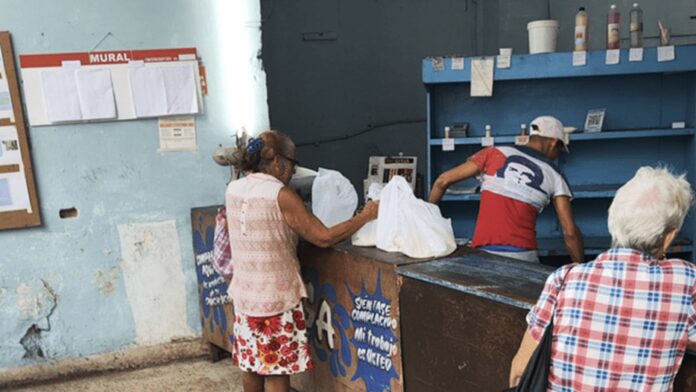
In Nuevo Vedado, the rice arrived at some ration stores last Friday along with “some chicken”, while at others it did not arrive until Saturday.
By Juan Diego Rodríguez (14ymedio)
HAVANA TIMES – At this point in January, when it is not long before the end of the month, the two pounds of rice per person that remain to be delivered to the ration stores have not yet arrived. “Only a few peas, cooking oil and kitchen detergent.”
“People are desperately asking about the rice, and the storekeeper says that it should arrive today or tomorrow,” Sandra tells 14ymedio. “They gave us a pound when the year began and then four, but I wouldn’t be surprised if what was missing doesn’t arrive.”
The small package of coffee has not appeared either, nor the new ration book, delayed due to a lack of paper, which the authorities have promised before March 30. “The chicken that arrived a few days ago is the one they owed from last year,” says a friend of Sandra’s, who reiterates: “No rice; you know, it’s at the North Pole.”
In the Havana municipality of Arroyo Naranjo, the scene is similar: “At the beginning of the month they sold us a pound of rice and two pounds of sugar per person, and two days ago they sold us the rest of those products but nothing else,” a resident tells this newspaper.
The customers of the ration store located at Hospital and Jesús Peregrino, in Central Havana, are luckier, since their rice allocation is complete, but that is not the case in other nearby establishments, such as the one on Reina Street. “Neither rice nor oil has arrived yet; even the cat is waiting,” a customer says sarcastically, nine days before the end of the month.
In Nuevo Vedado, the rice arrived at some ration stores last Friday along with “some chicken,” while for others it didn’t arrive until late Saturday night.
In short, they are distributing the products of the basic family rations to the neighborhoods and municipalities of the capital in an irregular manner. “They do it in a staggered way, as they say, and “staggered” means, for example, that the rice didn’t arrive until Friday,” explains a resident of the Luyano neighborhood.
In the provinces it’s not much different. In San Antonio de los Baños, Artemisa, of the seven pounds of rice that correspond to the rations, so far five have been sold. In Holguín, they sold six pounds, and the other one is missing.
On the Ministry of Internal Commerce’s website, where the delivery of chicken destined for the “normal family basket and social consumption” of Santiago de Cuba is reported, users take the opportunity to complain about the shortage of the moment: “It’s January 20, almost the end of the month, without even a pound in the ration store, and we have to pay 170 pesos a pound [at a private store] with such low wages. Please think of this town and leave off with the speeches. I am not an opponent or anything like that, but really this situation is unbearable,” explains a reader.
While consumers complain about the quantity, the quality of the rice is terrible. “Here the only rice fit for eating is sold in the private stores, but that costs between 160 and 220 pesos a pound, and not everyone can afford it,” says Sandra, who fears having no choice but to spend the money.
Last Thursday, the Ministry itself warned of the “problems in the fulfillment of the distribution cycles” of the rationed food, especially rice. The official explanation: “financial restrictions and operational problems, which have caused delays in the arrival of imports, production and transportation,” without giving further details.
The guaranteed “deliveries” of cooking oil and peas correspond to January and February, “because inventories are available.” As for sugar, which is also being distributed “in a fractional way,” it will be completed “in correspondence with the advances of the harvest, and the four pounds per capita will be sold.”
Other products that are delayed are salt and coffee, according to the official report. The same goes for powdered milk, which is also distributed “fractionally, in correspondence with the arrivals and fulfillment of the collections of fresh milk.” The ministry reports that this month Cuba will distribute a donation from the UN World Food Program, “with free delivery in some territories.”
Translated by Regina Anavy for Translating Cuba
Read more from Cuba here on Havana Times.




